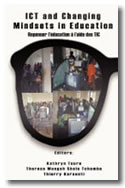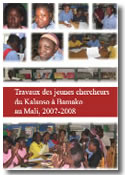Electronic Thesis: Pedagogical Appropriation of Information and Communication Technologies (ICT) by West African Educators December 5, 2016
 This research investigates how and why educators in West Africa, in Mali in particular, pedagogically appropriate information and communication technologies (ICT) and with what effects. Appropriation involves integrating newness into one’s very being and mobilizing it strategically to meet contextualized objectives, often in resistance to the status quo. It is assumed that ICT use is shaped by the values and objectives of users as well as by the local and global hierarchies of the milieus in which they are used. Qualitative research methods and interpretive approaches revealed meanings educators give to their reality and experiences. Interviews were conducted with 31 persons: 23 primary through high school teachers, six university professors, and two administrators.
This research investigates how and why educators in West Africa, in Mali in particular, pedagogically appropriate information and communication technologies (ICT) and with what effects. Appropriation involves integrating newness into one’s very being and mobilizing it strategically to meet contextualized objectives, often in resistance to the status quo. It is assumed that ICT use is shaped by the values and objectives of users as well as by the local and global hierarchies of the milieus in which they are used. Qualitative research methods and interpretive approaches revealed meanings educators give to their reality and experiences. Interviews were conducted with 31 persons: 23 primary through high school teachers, six university professors, and two administrators.
As educators digested ICT, it became part and parcel of their beings and everyday lives. As they adapted it to their milieus, they worked as cultural agents, mediating between ICT and society. The professors in particular expressed desires to use ICT to facilitate and enhance African participation in global debates and scholarly production and to transform how Africa and Africans are projected and perceived. Educators harnessed ICT for its transformative possibilities. The changes apparent in student-teacher relations (more interactive) and classrooms (more dialogical) suggest that ICT can be a catalyst for pedagogical change, including in document-poor contexts and ones weighed down by legacies of colonialism. Learning from the perspectives and experiences of educators pioneering the use of ICT in education in Africa can inform educational theory, practice and policy and deepen understandings of the concept of appropriation as a process of cultural change.
The full document is available here.


